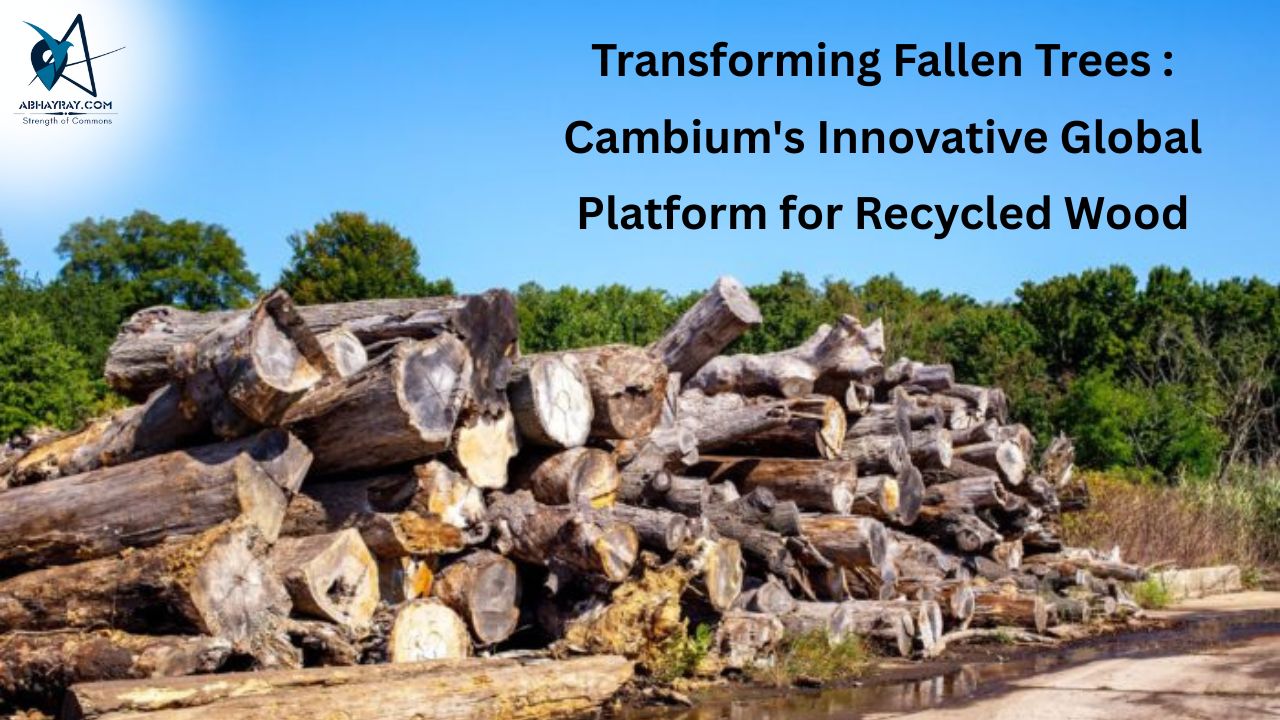Introduction
Each year 36 million trees fall due to decay, disease, natural disasters or clearing for new development. The vast majority of those trees are either burned, sent to a landfill or ground up for mulch, which wastes energy and causes carbon emissions.Now, new technology is being used to find, transport and recycle that wood and make it useful once again. Cambium is a startup aiming to disrupt the wood recycling space. Its Baltimore-based researchers are working on new ways to track, treat and transfer old wood into the supply chain. It bills itself as the platform “where timber meets tech.”
“We make it really easy to source wood that would have otherwise been wasted and we build technology for the wood industry so that we can save material, create new local jobs and address climate change at scale, ” said CEO Ben Christensen.
Startup Launches Global Tech Platform for recycled wood
Every piece of Cambium’s “carbon smart” wood has a barcode. Scan it, and Cambium’s app will identify what the species is, when it was milled and what its grade is.
Cambium’s technology helps find, recycle and then deliver the wood across the United States and to parts of Canada. The company works with local tree care services, trucking companies and saw mills as well as companies like Amazon CBRE @, Gensler and Room and Board.”We help truckers coordinate loads so they can actually move this material, and then we help sawmills source that material, track that material when they’re actually using it within their sawmill and then ultimately sell that material as well,” Christensen said.
A New Era of Sustainable Materials
A pioneering startup is transforming the wood industry by creating a global tech platform focused on recycled wood. This innovative platform connects recycled wood suppliers with manufacturers and consumers, streamlining the process of sourcing, tracking, and utilizing reclaimed wood. By leveraging cutting-edge technology, the platform ensures efficiency, transparency, and sustainability in the wood supply chain.
The platform aims to reduce environmental impact by promoting the use of recycled wood, which helps combat deforestation and waste. It supports the circular economy by encouraging the reuse of materials in construction, furniture, and design. This move aligns with the growing global demand for eco-friendly solutions, positioning the startup as a leader in sustainable innovation. With this tech-driven solution, the startup is helping to reshape the future of the wood industry, offering a scalable model for sustainable materials that benefits businesses, consumers, and the environment alike.
Cambium’s technology helps find, recycle and then deliver the wood across the United States and to parts of Canada.
While there are local wood recyclers, no one else is addressing the supply chain on a national scale, said Christensen, adding that he expects to eventually go global. This potential is enticing to investors. “For us, as a venture capitalist who is looking to invest in businesses that kind of can go to the moon and become billion dollar businesses, this meets all the criteria,” said Adrian Fenty, founding managing partner at MaC Venture Capital. Cambium is also backed by Volo Earth Ventures, NEA and Revolution’s Rise of the Rest Seed Fund, among others. The startup has raised $28.5 million in total funding so far.
If it was possible to salvage all the discarded wood material in the U.S., humans could source about half of our total demand, Christensen said. Cambium doubled its sales last year, and Christensen said the big growth was on the software side. Its revenue comes from direct sales of wood to end users and from sales of software into the wood industry to facilitate moving, tracking and selling the recycled product. “It’s critical for Silicon Valley investors, because we don’t want to invest in a wood company,” Fenty said. “We don’t want to invest in a construction company. We want to invest in a software company.”
Among the challenges ahead are the Trump administration’s tariffs on Canadian lumber, Christensen said. Those tariffs are expected to impact Cambium’s business, especially in the northeast region of the U.S. “We’re moving material to sawmills that are 10 or 20 miles away across the border, and so obviously trade policy really impacts how that material moves,” Christensen said.
Cambium’s Innovative Approach
Cambium’s selection as a top innovator in this challenge is a testament to its groundbreaking work in the field of sustainable forestry. Cambium’s approach involves transforming the way communities and organizations manage and utilize forest resources. By focusing on repurposing fallen urban trees and integrating technology in wood tracking and processing, Cambium turns potential waste into valuable, sustainable materials.
Impact of Cambium’s Work
Cambium’s work significantly impacts both environmental conservation and community development. By diverting wood from landfills and reducing the need for new lumber from deforestation, Cambium actively contributes to carbon sequestration and reduces the carbon footprint associated with wood products. Furthermore, Cambium’s initiatives support urban reforestation and foster economic growth by creating green jobs and supporting local artisans.
Recognition at the World Economic Forum
Being recognized by the World Economic Forum brings international attention to Cambium’s efforts and the importance of sustainable forest management. This recognition not only validates Cambium’s work but also provides a platform to share its innovative practices with a global audience. It opens doors for collaboration and scaling up its impact, driving forward the agenda for a sustainable forest economy.
The Future of Sustainable Forestry
Cambium’s recognition in the Sustainable Forest Economy Challenge is just the beginning. This accolade represents a step forward in the journey towards a more sustainable and responsible approach to forest resource management. Cambium is committed to continuing its innovative work, setting an example for others in the industry, and contributing to the global effort to create a sustainable balance between economic development and environmental conservation.
Cambium’s selection as a top innovator in the World Economic Forum’s Sustainable Forest Economy Challenge is a proud moment and a significant milestone. It reaffirms the importance of innovative, sustainable solutions in addressing the challenges facing our forests and the planet.
Conclusion
This innovative startup is redefining the future of the wood industry by creating a global tech platform for recycled wood. By bridging the gap between suppliers, manufacturers, and consumers, the platform promotes a sustainable and efficient supply chain. Its focus on transparency and technology drives the reuse of valuable materials, reducing waste and deforestation while supporting the circular economy. As the demand for eco-friendly solutions grows, this platform is poised to play a pivotal role in transforming industries like construction, furniture, and design. With its global reach, the startup is not only advancing sustainability but also setting the stage for a greener, more responsible future in the wood sector.
GMICapitals.com RaysVeda.com GetMyStartup.com LawCanal.com GetMyIndia.com ZinCob.com

